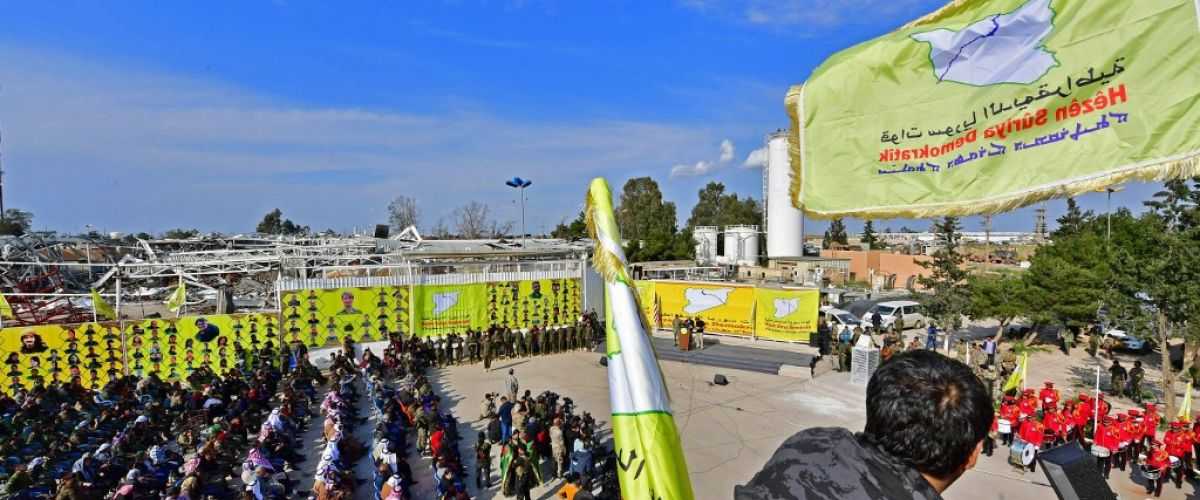Will oil spark conflict between ‘Qandil’ and the SDF in northeast Syria?
Will the new oil deal between the SDF and a US-based company create a fissure between Qandil and the SDF?
17 August 2020
Syrians attend a ceremony in the eastern Deir e-Zor province in tribute of SDF fighters killed during battles with ISIS, 3/23/2019 (AFP)
AMMAN — In a surprising move, the second-in-command of the Turkish Kurdistan Workers’ Party (PKK), Cemîl Bayik, has voiced opposition to a recently signed agreement between the Syrian Democratic Forces (SDF) and the American company Delta Crescent Energy LLC, to modernize and invest in oil wells in the SDF-held territory in northeastern Syria, describing the deal in a recent interview as “illegal.”
Bayik’s stance is consistent with the position of the Syrian government, which considers the deal “null and void, with no legal effect,” according to a statement by the Ministry of Foreign Affairs and Expatriates. The Ministry said the agreement “can be only described as a deal between thieves who are stealing and thieves who are buying, and it constitutes an assault against Syria’s sovereignty.”
Many have interpreted the signing of the agreement, announced by the Republican United States Senator Lindsey Graham, as American political recognition of the Autonomous Administration of North and East Syria (AA), the political umbrella of the SDF. But Bayik, in his recent statements, said that “Syria and its ruling regime is still recognized by international institutions,” and that everything “on the ground and under it belongs to all Syrians, and no party may appropriate it.” Agreements like this must pass through Damascus, Bayik added, since “Syria is going through an economic crisis, and this agreement must be in Syria’s interest.”
There has been a historical alliance between the PKK since its founding in 1978 and the Assad regime is well known, the party also controls the AA and the SDF through the Democratic Union Party (PYD). The PYD is the Syrian branch of the PKK, which is designated as a terrorist group by Turkey, the United States and the European Union.
A deepening dispute between ‘Qandil’ and the SDF?
The latest disagreement between the SDF and the leaders of the PKK—known as the “Qandil leadership” for their residence in the Qandil Mountains on the Iraqi-Turkish border—indicates of a new dispute, specifically between the Qandil leadership and the General Commander of the SDF, Mazloum Abdi.
Syria Direct previously reported on this dispute following intra-Kurdish negotiations between the PYD and the Kurdish National Council (KNC), which consists of 13 parties opposed to Damascus. The talks followed an initiative launched by Abdi on October 28, 2019, and were sponsored by the United States and France. The negotiations resulted in a preliminary agreement that includes a shared political vision for managing regions of northern and eastern Syria.
Abdi, who signed the latest oil agreement on behalf of the SDF, leads a coalition of Syrian Kurdish leaders in the SDF who are backed by the United States. On the other side is an alliance following the Qandil leadership and led by prominent figures Saleh Muslim, the founder and former president of the PYD, and Aldar Khalil, the former head of the Democratic Society Movement (TEV-DEM) who is a current member of the co-presidency of the PYD as well as one of the PKK cadres in Syria.
The Abdi alliance aims to expel Qandil cadres, the majority of whom are Turkish and Iranian Kurds, from Syria’s Kurdish territories, especially since they control many of the sensitive military, political, judicial and security positions as well as civil institutions in northeastern Syria. Known by the popular term “Cadro,” they are headquartered in the Rumeilan oil region of the Qamishli countryside in Hasakah province.
The SDF has decided to dismiss many PKK personnel, thereby reducing Qandil’s influence. Most recently dismissed was Ali Sher, one of the officials in charge of public finance in the AA, on July 11. Sabri Ok, one of the most prominent PKK leaders, also left the Syrian territories for Qandil in late 2019.
SDF officials and sources close to the PKK declined to comment to Syria Direct regarding the content of this report.
The expulsion of the Qandil cadres is one of the KNC’s fundamental demands to allow the negotiations with the PYD to continue. The United States plays a role in this context as well, to prevent any Turkish military action in northeastern Syria under the pretext of fighting the PKK influence in the area. In response, the “Qandil alliance” opposes the intra-Kurdish negotiations, describing them as a Turkish project, KNC sources told Syria Direct, since the KNC is a member of the Turkey-based Syrian National Coalition (SNC) and the KNC’s decisions and policy are also heavily influenced by the Iraqi Kurdistan region, which has ties with Turkey.
In this context, in his latest statement, Bayik denied having any knowledge of the background of the intra-Kurdish negotiations. He also criticized praise of Masoud Barzani, the former president of Iraqi Kurdistan; saying that current the status of the SDF and the AA, as well as the “popularity of the [PKK] in Rojava,” are due to Abdullah Ocalan, the founder of the PKK. This view, however, may explain the SDF’s seriousness in continuing to distance itself from the Qandil leadership.
The US-based media website Al-Monitor has suggested that the president of Iraqi Kurdistan, Nechirvan Barzani, and prime minister Masrour Barzani played a role in the successful signing of the oil agreement. If true, this could worsen relations between Qandil and the SDF because Iraqi Kurdistan is one of the staunchest political opponents of the PKK. That also coincides with the Iraqi region’s call for the PKK to remove its members from Iraqi Kurdistan’s territories and for the PKK and Turkey to fight their battles elsewhere.
This report was originally published in Arabic and translated into English by Mateo Nelson.







